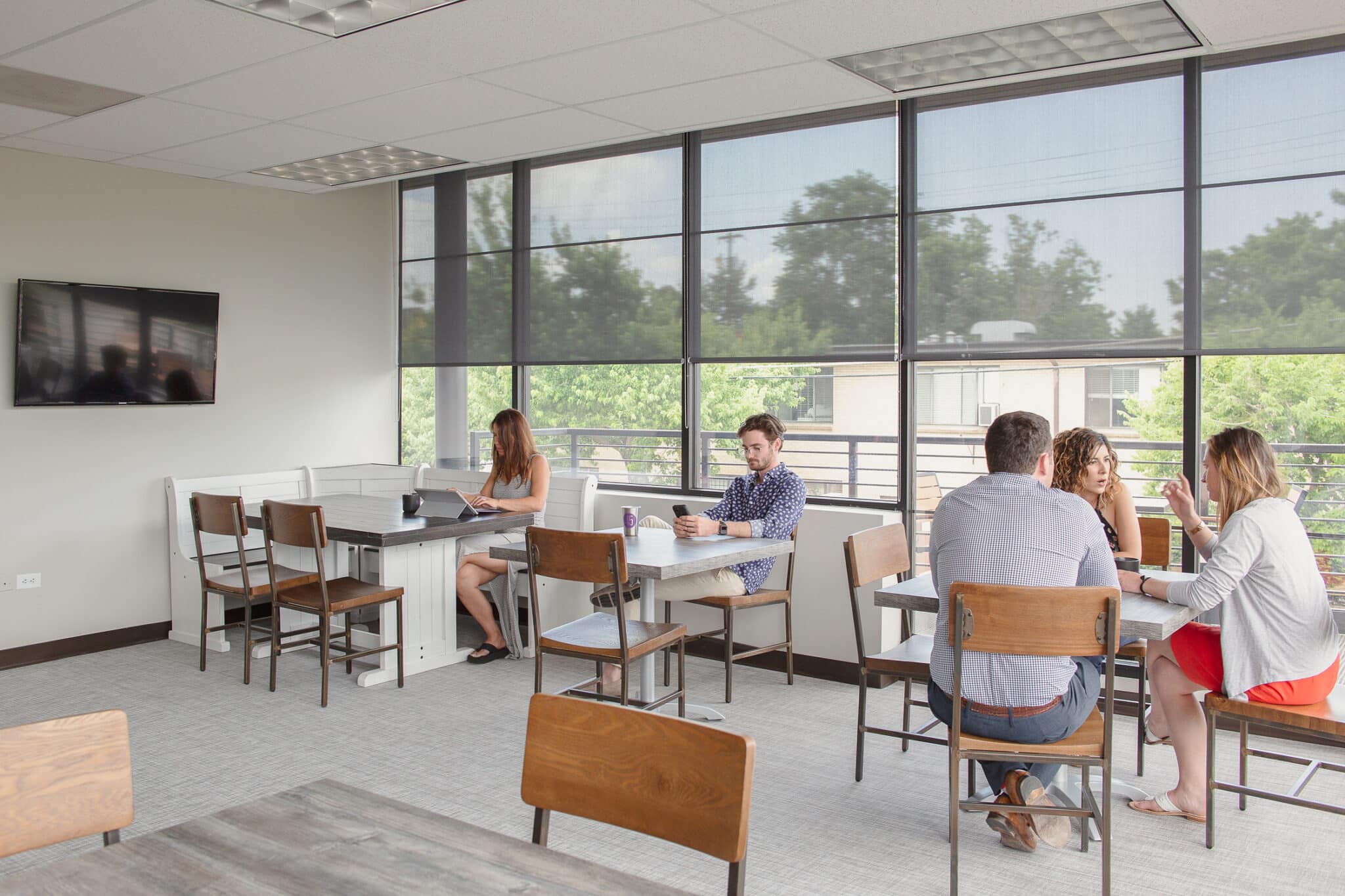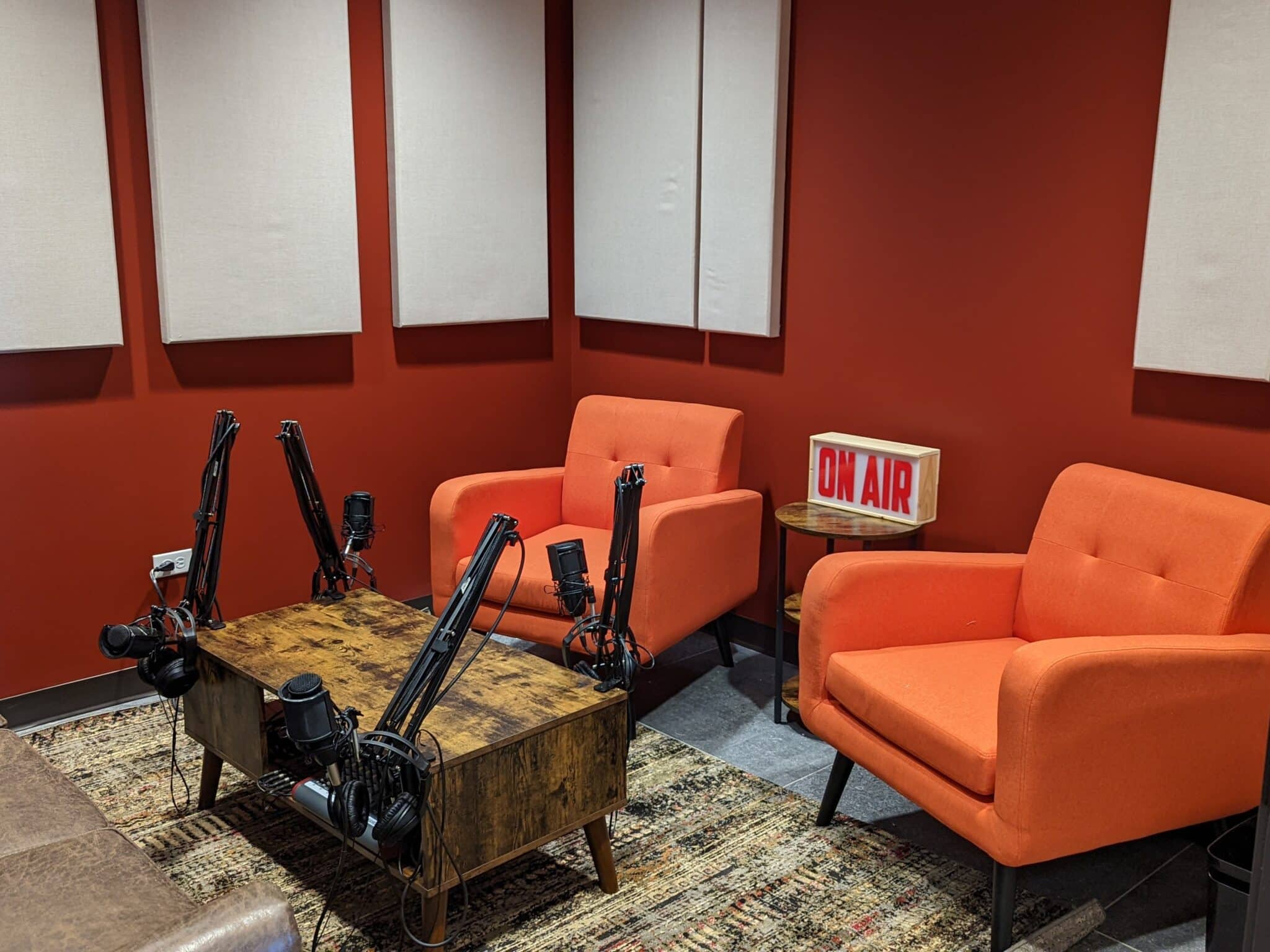
Creative Density’s Sunnyside location is at 4045 Pecos St. (Courtesy Creative Density)
Craig Baute is always on the lookout for the right neighborhood to share his space and his profits.
The 37-year-old owns Creative Density, a network of coworking spaces across Denver and Chicago founded in 2011. He recently sold off a location in Lone Tree and doubled his space in Sunnyside to refocus the business’ real estate in “urban neighborhoods” around downtown.
“It is the size that downtown requires is what’s deterring me,” Baute said of his apprehension for moving further into the center of the city.
Creative Density’s location at 4045 N. Pecos St., originally 6,000 square feet, opened in an additional 7,000 square feet on Thursday. Creative Density now operates in two of the three units on the second floor of the property. It originally took over the space in March 2022.
Baute plans to outfit the new Sunnyside space with more media tools, beefing up an existing podcast studio with video equipment. He also plans to nearly triple the number of “hot desks,” shared workstations reserved on a first-come, first-served basis in the Sunnyside spot.
“There’s been like two days every week where you walk in and every desk is full, and we need to accommodate the increased demand,” he said.

The podcasting studio at Creative Density’s Sunnyside location. (Courtesy Creative Density)
A different force, meanwhile, has pushed Baute inwards from the suburbs. He sold off his 6,500-square-foot Lone Tree location at 10185 Park Meadows Drive to another coworking operator in the middle of October.
“It’s oversupplied, which puts pricing pressure on how much you can charge customers,” Baute said of the suburban office market. “And it still costs the same to start the space. A desk in the suburbs to buy still costs the same as a desk in downtown to buy. So it’s like your startup costs are the same but your competition is really high right now along I-25.”
Figuring out the tricky office market has been a challenge for businesses such as Baute’s to navigate. For the moment, he’s decided to avoid entertaining offers for downtown space.
“We’ve talked to probably about four landlords downtown. And we’ve passed on all of them,” he said.
Baute pointed to WeWork’s recent bankruptcy as an example of the problems with downtown coworking locations, blaming its penchant for large spaces as a contributor to its downfall.
“One of WeWork’s flaws is that they concentrated on very large locations,” he said. “We’re talking 40,000 to 100,000 square feet — huge spaces — and I’ve always done sub-12,000-square-foot spaces. I still think downtown you could probably have a lot of little coworking spaces but doing these 40,000-square-foot spaces right now, there’s a lot of uncertainty, even in a 20,000-square-foot space.”
Instead of signing leases, Baute prefers to share his profits with landlords via a “management agreement,” which he said is “just the only way that coworking chains are really growing right now.”
Downtown, though, is where the economics of these agreements falls apart, he added.
“Often, there’s an initial fee, and then they get the first dollars that equal up to that $35 a square foot, so they might get the first $50,000 a month and then there’s a profit share after that,” Baute said. “I’m not sure if I can get to that $50,000 number in a reasonable timeframe. So, I don’t want to take on the project.”
Meanwhile, a different phenomenon is taking place in the suburbs. The differences in geography and clientele make it difficult for Creative Density to compete in the area.
The appetite for a longer commute is higher there, Baute said. That expands his competitive market beyond those living nearby to those within a 5-to-10 mile radius, much larger than the roughly two miles he targets at his more-urban locations.
“This problem is, in my opinion, that people buy homes with the intention of having a home office in those large suburbs,” Baute said. “LoHi and Park Hill, people’s homes are 1,000 to 1,700 square feet, and they have a family with two kids. It’s not designed to be cohesive to work out of, so they seek a coworking space.”
In total, Baute operates six coworking locations, four in Denver and two in Chicago. The Lone Tree sale and Sunnyside expansion aren’t the only moves the business owner has made over the past year. He moved out of his first location Uptown in February, taking up space in the Fluid Coffee shop at 535 E. 19th Ave.
“We took over like three-fourths of Fluid … the coffee shop is significantly smaller. It has like three tables, basically, and then it’s Creative Density. To me, it’s like the best. I start my morning out there because I’m in a coffee shop but I have a sit-stand desk with an ergonomic chair, a monitor and a phone booth to jump into,” Baute said.
The coworking operator also runs another business, Denswap. Baute launched it in 2019 as a consulting firm to advise other property owners on starting their own coworking or flex space. He calls it an “AirDNA for coworking.”
“We’ve developed a product where we can project coworking demand and current supply anywhere in the United States,” he said. “Property owners can know if coworking is a good idea or a bad idea, do a pro forma. And investors use us so that they can know where to buy buildings to turn into flex, to turn into coworking spaces.”

Creative Density’s Sunnyside location is at 4045 Pecos St. (Courtesy Creative Density)
Craig Baute is always on the lookout for the right neighborhood to share his space and his profits.
The 37-year-old owns Creative Density, a network of coworking spaces across Denver and Chicago founded in 2011. He recently sold off a location in Lone Tree and doubled his space in Sunnyside to refocus the business’ real estate in “urban neighborhoods” around downtown.
“It is the size that downtown requires is what’s deterring me,” Baute said of his apprehension for moving further into the center of the city.
Creative Density’s location at 4045 N. Pecos St., originally 6,000 square feet, opened in an additional 7,000 square feet on Thursday. Creative Density now operates in two of the three units on the second floor of the property. It originally took over the space in March 2022.
Baute plans to outfit the new Sunnyside space with more media tools, beefing up an existing podcast studio with video equipment. He also plans to nearly triple the number of “hot desks,” shared workstations reserved on a first-come, first-served basis in the Sunnyside spot.
“There’s been like two days every week where you walk in and every desk is full, and we need to accommodate the increased demand,” he said.

The podcasting studio at Creative Density’s Sunnyside location. (Courtesy Creative Density)
A different force, meanwhile, has pushed Baute inwards from the suburbs. He sold off his 6,500-square-foot Lone Tree location at 10185 Park Meadows Drive to another coworking operator in the middle of October.
“It’s oversupplied, which puts pricing pressure on how much you can charge customers,” Baute said of the suburban office market. “And it still costs the same to start the space. A desk in the suburbs to buy still costs the same as a desk in downtown to buy. So it’s like your startup costs are the same but your competition is really high right now along I-25.”
Figuring out the tricky office market has been a challenge for businesses such as Baute’s to navigate. For the moment, he’s decided to avoid entertaining offers for downtown space.
“We’ve talked to probably about four landlords downtown. And we’ve passed on all of them,” he said.
Baute pointed to WeWork’s recent bankruptcy as an example of the problems with downtown coworking locations, blaming its penchant for large spaces as a contributor to its downfall.
“One of WeWork’s flaws is that they concentrated on very large locations,” he said. “We’re talking 40,000 to 100,000 square feet — huge spaces — and I’ve always done sub-12,000-square-foot spaces. I still think downtown you could probably have a lot of little coworking spaces but doing these 40,000-square-foot spaces right now, there’s a lot of uncertainty, even in a 20,000-square-foot space.”
Instead of signing leases, Baute prefers to share his profits with landlords via a “management agreement,” which he said is “just the only way that coworking chains are really growing right now.”
Downtown, though, is where the economics of these agreements falls apart, he added.
“Often, there’s an initial fee, and then they get the first dollars that equal up to that $35 a square foot, so they might get the first $50,000 a month and then there’s a profit share after that,” Baute said. “I’m not sure if I can get to that $50,000 number in a reasonable timeframe. So, I don’t want to take on the project.”
Meanwhile, a different phenomenon is taking place in the suburbs. The differences in geography and clientele make it difficult for Creative Density to compete in the area.
The appetite for a longer commute is higher there, Baute said. That expands his competitive market beyond those living nearby to those within a 5-to-10 mile radius, much larger than the roughly two miles he targets at his more-urban locations.
“This problem is, in my opinion, that people buy homes with the intention of having a home office in those large suburbs,” Baute said. “LoHi and Park Hill, people’s homes are 1,000 to 1,700 square feet, and they have a family with two kids. It’s not designed to be cohesive to work out of, so they seek a coworking space.”
In total, Baute operates six coworking locations, four in Denver and two in Chicago. The Lone Tree sale and Sunnyside expansion aren’t the only moves the business owner has made over the past year. He moved out of his first location Uptown in February, taking up space in the Fluid Coffee shop at 535 E. 19th Ave.
“We took over like three-fourths of Fluid … the coffee shop is significantly smaller. It has like three tables, basically, and then it’s Creative Density. To me, it’s like the best. I start my morning out there because I’m in a coffee shop but I have a sit-stand desk with an ergonomic chair, a monitor and a phone booth to jump into,” Baute said.
The coworking operator also runs another business, Denswap. Baute launched it in 2019 as a consulting firm to advise other property owners on starting their own coworking or flex space. He calls it an “AirDNA for coworking.”
“We’ve developed a product where we can project coworking demand and current supply anywhere in the United States,” he said. “Property owners can know if coworking is a good idea or a bad idea, do a pro forma. And investors use us so that they can know where to buy buildings to turn into flex, to turn into coworking spaces.”
